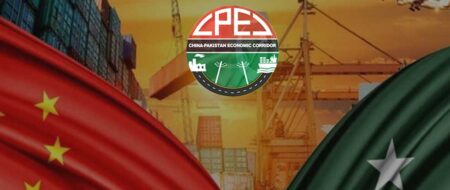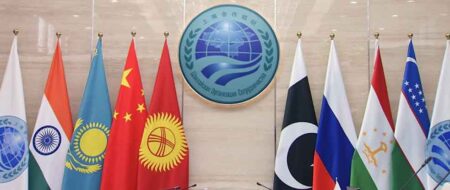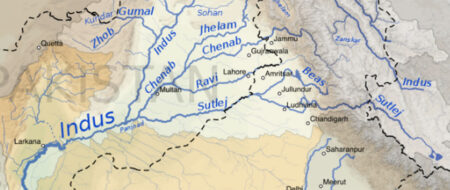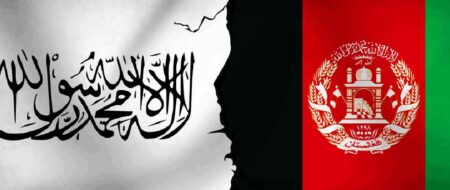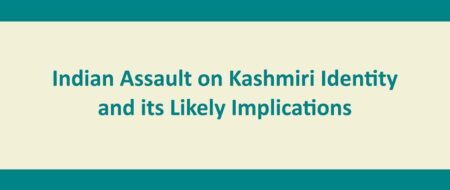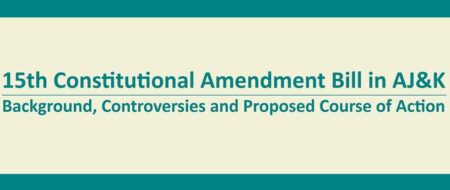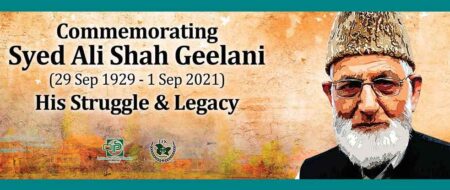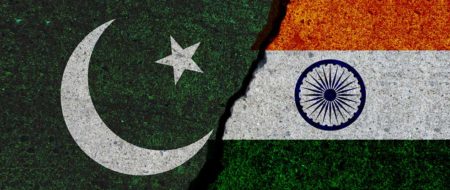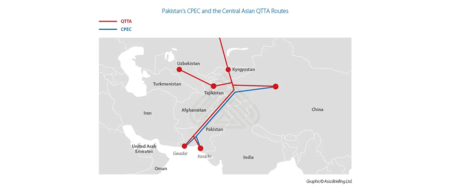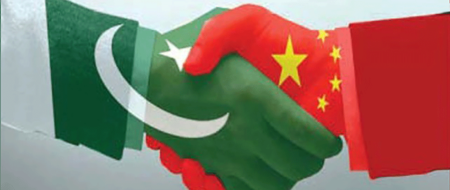Afghan Parliament: Expectations, Challenges and Opportunities
Devastated by thirty years of wars and conflicts, Afghanistan took the final step towards stability and democratization when it inaugurated its newly elected parliament on 19 December 2005 – the first in three decades. And with successful launching of the parliament, the last phase of Bonn conference that had envisioned democracy for Afghanistan concluded.
Policy Perspectives , Vlm 3, No.2
Abstract
[Devastated by thirty years of wars and conflicts, Afghanistan took the final step towards stability and democratization when it inaugurated its newly elected parliament on 19 December 2005 – the first in three decades. And with successful launching of the parliament, the last phase of Bonn conference that had envisioned democracy for Afghanistan concluded. The International community and especially the Afghan people were eagerly waiting for the historic parliamentary session and had pinned their hopes on the fledgling institution where majority of the members were new to the system. Faced with great challenges, Afghan parliament was widely considered a positive change in the political arena of Afghanistan. This paper aims at reviewing the six-month experience of the parliament as well as its formation to ascertain as to what extent it achieved its objectives and fulfilled the stakeholders’ expectations. The paper also analyzes the scope, challenges and opportunities lying ahead, and makes viable recommendations. The data for the paper has been collected from open literature and interviews conducted on field. – Editor]
Background
Election Announcement: The democratization process began as the outcome of Bonn Conference held on December 5, 2001, in Germany, and ended in proposing the parliamentary elections. The establishment of a transitional setup, followed by an emergency Loya Jirga (Grand Assembly) to form an interim government was the initial step. The interim government, then, convened a constitutional Loya Jirga that legitimized the interim government by endorsing it, approved the presidential form of government, announced the schedule for presidential elections and configured a new constitution for the country.
The constitutional Loya Jirg’s exhaustive session in Kabul lasted over a month, from December 3, 2004 to January 4, 2005. The debate in constitutional Loya Jirga over the form of the government had divided the delegates into two groups: a pro-parliamentary led by Jamiat-e-Islami of Prof. Burahnuddin Rabbani and pro-presidential system led by the supporters of Karzai. In order to resolve the issue, Zalmay Khalilzad, the American ambassador and special envoy of the US president, mediated between the contending parties. The contentious point was ultimately resolved through consensus on a presidential form of government with a strong bicameral legislature consisting of Wolesi Jirga (house of people or lower house) and Mesharano Jirga (house of elders or upper house). The new constitution, however, could not clearly address president-parliament relation in case of stalemate between the two.
Constitutional Provisions: There are several articles in the new constitution that govern the making and functioning of the new parliament. Some articles describe the check and balances between the executive and the parliament for a smooth functioning of the democratic institutions.
Article 81 of the constitution states:
“The National Assembly of the Islamic Republic of Afghanistan, as the highest legislative organ, is the manifestation of the will of its people and represents the whole nation…”[1]
The ostensible implication highlights the National Assembly’s authority towards law making encompassing ratification, amendments and abrogation of the laws and legislative decrees. It also has the authority, as the highest decision making body, to ratify the strategies of the government both at the national and international levels.[2]
In addition, The Wolesi Jirga enjoys special powers with regard to the functioning of the government which are provided in the article 91 of the constitution as under:
1. Deciding on interpellation of each of the ministers in accordance with the provisions of article 92 of this constitution
2. Taking the final decision about the state’s developmental programs and state budget
3. Approval of the appointments according to the provisions of this constitution.
The subsequent article states that the Wolesi Jirga, based on a proposal by the two -tenth of all members, can interpellate any of the Ministers.
According to the article 160, the efforts were to be made to hold presidential and parliamentary elections simultaneously.
To safeguard the continuity of the parliament, constitution does not allow president to dissolve the parliament, but article 65 of the constitution provides:
“The President can call for a referendum on important national, political, social or economic issues. Call for referendum shall not be contrary to the provisions of this constitution or for the amendment of it.”[3]
As the constitution provides, the President cannot dissolve the parliament in case of the state of emergency, since the declaration of the state of emergency also requires the National Assembly’s approval.[4]
The constitution provides many clauses for the smooth functioning of the executive and parliament yet it could not clearly draw a line to separate powers of the president and parliament particularly in cases of any irresolvable differences between the two. For instance, if there is a civil war in the country and president believes that parliament is party to it and wants to dissolve the parliament, the parliamentarians would likely refuse approval to such call. The possibility of such scenario points out the discrepancies in the constitution and may create a mayhem [f1]in future Afghan politics.
Expectations
Notwithstanding any constitutional deficiencies, the success of the Parliament depends on the way different stakeholders look at it. A lot rests with their acceptability or otherwise of the whole process. It would be pertinent to dilate on their expectations and perceptions toward the emergence of the parliamentary process.
a) The People: The war-torn Afghanistan, unable to afford enabling environment conducive to economic activity, was paralyzed on the face of extreme poverty. Most of the Afghans were fed up with continued bloodshed and the resulting poor quality of life and low standards of living. They earnestly welcomed the new democratic system. They ignored the sporadic and strayed bullets and thronged to polling stations in presidential elections for demonstrating their support for Karzai through their ballots. They had many expectations from President Karzai but he could not deliver as much relief to the poor as they had expected nor was he able to expedite the reconstruction and rehabilitation processes. The widespread unemployment, unbearable miseries, lack of shelter, absence of basic facilities and infrastructure, and rampant lawlessness drove many Afghans to pin their hopes on the new parliament.
Mohabbat Ali, a locksmith from Kabul, told The Christian Science Monitor (CSM) before elections:
“I don’t know who I’m voting for, but I’ll look for a good man. I don’t care if he is a jihadi or a technocrat; I just want someone who will serve the country. I don’t expect big changes from the parliament. But I want a parliament to create jobs, not to destroy our homes and shops, and build roads in their place.”[5]
Many Afghans wanted the warlords to be tackled effectively so they anticipated the new parliament will address this issue as well. Zarguna Hassan, a journalist for Radio Zohra in Kunduz said:
“People are ready to vote and they think that if we have good people who haven’t committed any human rights violations, then we will have a good parliament. But there are commanders who have given up their guns, and their soldiers still have weapons. So the first priority is that we need to completely disarm the factions.”[6]
Many Afghans interviewed by different media organizations before elections voiced almost the same concerns and expectations. They were hoping that the new parliament will restore peace, improve economic and security conditions, provide shelter, rebuild and reunite the country.[7]
People also expected that the new parliament will balance the power of executive and stop the widespread corruption in the administration and will protect the Islamic identity of the state. They expected that parliament could overcome all the challenges facing the nation both from within and without. They believed that their voices, aspirations and wishes will have a way to the top leadership through the Parliament.[8]
Some women, on the other hand, expected the parliament to give them representation in decision making as there were quota reserved for them. Zarmina Hassan, a candidate from Kunduz, said:
“…we need to try very hard to bring equal rights for women in this country, in economic, social, and political affairs…”[9]
Majority of the Afghans were optimistic that parliament would be a good omen for them and considered it a good system for their coming generations.[10] Yet the people actively involved in the resistance against the occupation are opposed to the process for obvious reasons. There were some skeptical people who were of the opinion that these so-called democratic elections were not indigenous but exported by the US.[11]
b) President Hamid Karzai: Hamid Karzai wanted the establishment of parliament in his own right. He wanted to get legitimacy for his government both inside and outside of Afghanistan. He also wanted to show his soft image to the world and to assert that he did not fail in bringing the real democracy to the war-torn country. The aim was to justify his position as the sole steward of the directionless Afghanistan after the fall of Taliban. The underlined objective was to convince the nation and the rest of the world that he was the only choice for the top slot. Moreover, it was the requirement of the Bonn conference to have a parliament in Afghanistan and he was bound to abide by the agreement which was authenticated by the international community.
Yet he was hoping for a supportive parliament instrumental in establishing his authority.[12] He anticipated confirmation of his nominees for cabinet and Supreme Court without any obstacles in his way. He had the longing to see his policies unchallenged.
c) Local and influential leaders: Most of the influential Afghans who had stakes in the previous system could not afford loosing this opportunity for the fear of being left behind in the new set up[13]. Thus to remain powerful and influential they earnestly took part in the elections. A vast majority of the warlords, former Mujahideen, secularists, ex-communists and women were among the contesting candidates.
Their expectations and intentions were different. Some of them who had no chance to rise in the previous systems were happy as this was the chance for them to reach the corridors of power. Some candidates had low opinions about the working of the parliament but wanted to try it. Moreover, some of the women were very optimistic as they had a chance to get into parliament and have their say. They had been marginalized and segregated in all the previous systems. There were few candidates who voiced concerns of possible conflicts in the coming parliament as lawmakers of different political and ideological backgrounds would win.
d) International Community [IC]: The establishment of Afghan parliament was the last phase of the Bonn process which was authorized by Afghan government and IC- the main stakeholders in IC are the US, NATO countries, donor agencies and the UN. IC had many expectations from the parliament as it would build their image for introducing democracy to Afghanistan.
But it aspired to see the new parliament with more women and liberal representation yet no warlords or former Mujahideen. Their first desire was fulfilled as the constitution guarantees a quarter of parliament seats for women. But its wish for a parliament to be a house of liberals did not come true.[14] Its main target, however, was the establishment of a parliament and its smooth running.
Composition of the parliament and Elections
The Parliament consists of Wolesi Jirga (Lower House) and Mesharano Jirga (Upper House) with a guaranteed representation of women. Lower house is composed of 249 members where 10 seats are allocated for the elected representatives of the nomads who are elected for five years term. Afghanistan adopted Single Non-Transferable Vote (SNTV) system for its parliamentary elections. The 239 seats of lower house were divided among provinces by Joint Election Management Board (JEMB)[15] on the basis of their population which was determined by the central census department of Afghanistan. Each province was allocated at least two seats.[16]
Mesharano Jirga is composed of elected and appointed members. Its 102 members are elected for four years term. The number of seats in Mesharano Jirga is three times the number of the provinces of Afghanistan. One third of the members are elected by the provincial Councils,[17] one third by the District Councils, and the remaining one third are appointed by the president.[18] But in the absence of the district councils, its candidates too were elected by provincial councils on temporary basis. Each provincial council nominated two representatives, one permanent and the other temporary.
According to the constitution, the number of seats to be allocated to women in lower house should be twice the number of the provinces in the country. Thus at least 68 seats in lower house were reserved for women – almost 25 per cent. The Constitution provides that even if a woman could not secure the majority vote, she can become part of the parliament through quota system[f2].[19] Afghan constitution also guarantees 17 per cent seats of the Mesharano Jirga for women. The President is constitutionally obliged to select 17 women out of his stipulated quota of 34 seats.
The parliamentary elections were held on September 18, 2005, after a delay of one year. There was tough competition among 2800 candidates for 249 seats of the lower house which showed the high degree of the interest in the election. Candidates from different political and ideological backgrounds participated and made their way to the parliament.
Afghan elections were based on Single Non-Transferable Vote system. The candidates were not allowed to contest the elections as formal representatives of any political or religious parties. The people, therefore, voted for individuals and not for parties.
Some of the former Mujahideen parties had field their candidates in the respective constituencies. Most of them did not have any political program or agenda, but with the emergence of new circumstances they found themselves irrelevant and tried to adapt to the new situation. Some were renamed, and by disarming their militiaman converted to political parties, for instance, Itehad-e-Islami led by Professor Abdul Rabb Rasul Sayyaf and Harakat-e- Inqilab-e- Islami of Ahmed Nabi were renamed as Dawat- e- Islami and Harakat-e- Islami Mardum-e-Afghanistan respectively. On the other hand some of these parties broke up like Jamiat-e- Islami of Prof. Rabbani.
Additionally, with the support of the Western institutions, many political institutions gradually started surfacing. Freedom of Press and Expression and the ratification of the Political Parties acts provided an opportunity to new political parties to step into the political arena. Subsequently their number reached to dozens, and about eight new political parties were registered with the Ministry of Justice.[20] There is no significant difference in the manifestos of most of these parties; all of them claim that they support democracy, human rights, women rights, and believe in strengthening of civil institutions in the society. But the new parties were not able to quickly gain support of the people for two reasons:
1) Afghans were not happy with the party politics of the past that had resulted in bloodsheds;
2) The inability of these parties to establish contacts with the masses. These parties gained few seats in the parliament and in some cases party leaders faced defeats.
Karzai’s attempts to encourage the opposition groups to help strengthen peace in the country compelled him to allow some of those parties that were fighting against the government to take part in politics. He encouraged some of the Taliban leaders including Maulawi Wakeel Ahmad Mutawakil, former foreign minister of the Taliban regime, to join government. Some of them contested the elections and made their way to the parliament.[21] Efforts were made to register Hizb-e-Islami of Gulbadin Hekmatyar with the ministry of Justice, but till the end of parliamentary elections it was not registered. Finally this party was registered as Hizb-e-Islami Afghanistan with Khalid Faruqi, a military commander from southern Afghanistan, as its leader[22].
The inherent problem of the SNTV system was that people voted for individuals instead of ideas. This system left the political institutionalization weak and fragile which is mandatory for democratic system. This system can also give rise to parliamentary groups in the parliament instead of parties which can be influenced by the president easily.
Resultantly, majority of the seats were grabbed by warlords and former Muhahideen and other like-minded groups who had substantial influence in their respective areas. They secured almost 80 per cent of the seats.[23] A number of foreign organizations, working on human rights, democracy and women rights, criticized Hamid Karzai for failing to stop Mujahideen from entering into the parliament”.[24]
There were also concerns that provinces were not given their due share of seats during allocation and grievances over the demarcation of boundaries of the provinces.[25]
There was also ambiguity in the functioning of provincial councils which nominate representatives in the upper house. The status of these councils is of traditional gathering of local elders with no executive authority. As their function is to oversee the provincial affairs, they might end up in conflict with provincial administration or indulge in power struggle with the provincial authorities. The authority, on the other hand, to dissolve a council is awarded to the president and the Supreme Court. This undermines the independence of the council. Had this authority been awarded to the national assembly or its standing committee, the independence and democratic nature of the council would have been preserved.
Parliament in session
Chairs’ Elections: The seven candidates including three women namely: Prof. Abdul Rabb Rasul Sayyaf, Younas Qanuni, Syed Ishaq Gillani, Abdul Haq Ulumi, Safia Siddiqi, Qadria Yezdan Parast and Shukria Barakzai, were contesting for the chair of president of the lower house. No candidate secured majority vote in the first round of the elections.[26] In the second round, only the top two candidates, Qanuni and Sayyaf, were in the run. Qanuni despite opposition from the Karzai government [27] was elected as the president of the lower house by 122 votes against 117.[28]
While for the upper house, there were three candidates namely: Sibghatullah Mujaddadi, Engineer Arif and Bakhtar Aminzai in the run for the chairmanship. Here again no candidate could attain the majority vote in the first round. Finally, however, Mujaddidi won the chairmanship of the senate.
Rule of Procedures & Working Sessions
According to the article 107 of the constitution, the National Assembly convenes two regular sessions each year. The total time of both sessions is nine months. The assembly can extend this period when necessary. Extraordinary sessions of the assembly during recess can also take place by the order of the President.[29]
The sessions are scheduled from January 21 to June 5, and July 23 to December 6 with two summer and winter holidays; each session spans on forty-five days. However, the current session was started at December 20, 2005 working a month before the required date, for establishment’s needs and ended on June 6, 2006.
In this first session, the parliament administered itself well and passed necessary regulations for its working procedures. The Afghan Constitution requires each house to have standing committees to study the subjects under discussion[30] with the power to question ministers[31]. The lower house formed eighteen and the upper house formed sixteen standing committees respectively.
Taken as a whole, the leaders of committees (in Lower House) are proportionately representative with eight Pashtuns, five Tajiks, three Hazaras and two Uzbeks; a majority comes from militant background but there is a mix of others including leftists, a Kuchi[f3] (nomad) and one or two new faces. While gender representation is three women to fifteen men, it is still far better than anywhere in the executive.”[32]
The parliament discussed the president Karzai’s decree [f4]regarding the responsibilities of the parliamentarians in its last meeting on June 5. The presidential decree was upheld. The decree required the MPs to visit all electoral constituencies divided into 8 zones during the summer holidays. It was decided MPs of each zone would travel to the related provinces of the mentioned zone; meet the people and make reports on their problems. According to the presidential decree, the MPs are also required to study the security situation, projects related to reconstruction,, moral situation and the role and effectiveness of the government officials in their respective provinces.[33]
In the Mesharano Jirga, the seven political groups were formed within days of its establishment. They were organized by the senators with a careful mixing of regions and ethnicity but some of these groups could not hold a meeting for several months.[34]
Other Significant Debates & Decisions in the first session
· The Parliament debated presidential nominees for cabinet, and after a long discussion, the five out of 25 cabinet ministers were rejected in the vote of confidence session on April 20, 2006.
· It also rejected nominee, Fazal Hadi Shinwari, for the post of Chief Justice of Afghanistan on May 27. [35]
· The most important debate of the parliament was pertaining to $2.07bn budget for the fiscal year 2006-07. The budget was presented in the upper house on March 8. The upper house made a number of suggestions such as increasing the funding of Provincial Councils and directing more money to Agriculture and reservoirs. The lower house, however, took much time to debate and demanded increase in salaries of the government employees and the stipend for disabled. The budget was finally approved on June 3.[36]
· The parliament ratified a proposal to balance the salaries of the government employees.[37]
· Calling for the prosecution of the US troops, involved in a fatal traffic accident when their vehicles rammed into civilian cars and left seven Afghans dead and sparked hours of intense rioting in Kabul,[38]was perhaps the most significant political message disseminated by the parliament.
· The Parliament interpellated the Minister of Higher Education and prevented [f5]the process of merger of the Faculty of Sharia and some other faculties proposed by him.[39]
· It also interpellated the minister of Information and tourism and criticized him for immoral songs and semi-pornographic videos shown by some private TVs and Cable channels and asked him for discontinuation of such videos.[f6]
· About the Agreements and treaties, President Muhammad Yonus Qanuni stated, after the London Conference, that to accept or reject amendments or to veto the agreements is the prerogative of the National Assembly.[40]
· In case of blasphemous cartons of Prophet Muhammad (PBUH) published by some European Newspapers, the parliament demanded the government to severe its formal ties with the Danish Government.
· In the case of Abdul Rahman, who converted to Christianity, President of the lower house sent a letter to the Interior Ministry on behalf of the entire parliament demanding Rahman not to be allowed to leave Afghanistan. The parliament condemned Karzai government for releasing Abdul Rahman and asked the government to bring him back to stand trail.[41]
· The parliament raised the issue of import and consumption of alcohol in Afghanistan and demanded the government to stop it.
· It established a library initially comprised of 3000 books for the use of parliamentarians. The library is connected to the Library of the US Congress and it issues regular news bulletins for the parliament.[42]
Review of the First Session: The first session of the parliament was an historic event. The lawmakers from different ethnicities and various ideological backgrounds, along with a significant number of women MPs, formed a splendid mosaic. Some political analysts believed that it could take months before the parliament would be able to fully perform its duties. Many of the legislatures have little or no experience in the politics and scant knowledge about how a parliament functions.[43] Yet it worked smoothly; held elections of presidents and their deputies for both houses, successfully executed house procedures, formed Standing committees[44] in both houses and soon discussion on different issues was started. Amidst fears of fallout, most of discussions continued in peaceful and without making noise. Even during discussion on hot issues, most of parliamentarians remained patient.
Parliament, however, could not deliver much on the economic front as it has no control over the budget where major funding comes from donor agencies and through NGOs[45] but it did recommend raise in salaries of the government officials and stipend of the disabled.
It asserted itself to check executive and rejected presidential nominees for cabinet and supreme court; thus, stopping any authoritarian designs of the president. This check on the executive is a healthy sign for democratic institutions.
Despite fears of ethnic conflicts, the first session proved that it could work together and is in place for the unity and integrity of the Afghan nation. It can be assumed that ethnic politics will not hamper its pace and functioning.
There were fears among liberal Afghans that the parliament has a conservative Islamic majority which will lead to greater restrictions on the media and in other areas. But standing against them, many Afghans hope, are 68 women MPs (Members of Parliament). [46] They constitute around 28 percent of the National Assembly.[47] They give Afghanistan one of the highest proportions of female parliamentarians in the world.
As far as the security situation is concerned, it took a bold decision to pass a resolution calling for the trial of the US soldiers who killed civilian Afghans in an accident but could not do enough to stop unbridled operations of the coalition troops. It could play no significant role in improving the law and order situation.
Notwithstanding, the criticism of some Afghan intellectuals including some MPs for failing to achieve anything significant and wasting time on irrelevant discussions,[48] the Parliament has been successful in developing within the house and without a sense of confidence that it is capable of doing its jobs and will continue like this in future too. Despite all the problems, the parliament is able now to have an influence on the system to a certain degree, to have a role in reforming the bureaucratic system of the country, “until now there was a gap, and the government was acting alone…it is a positive step.”[49]
Challenges
The success of the Afghan parliament will heavily rely on how it avails the opportunities available to it and handles the challenges if faces. It generally relishes the confidence of the people, support of IC and interest of sitting MPs. But there are some serious challenges out there which, if not faced with wisdom and professional excellence, might prove to be the stumbling blocks in its way.
Developing necessary skills: Majority of the MPs are not skilled in parliamentary affairs. The lack of adequate education and expertise are likely to hamper the desired outcomes. The capacity building of the MPs would be a great challenge facing the parliament. They are expected to demonstrate extraordinary tolerance since they come from different ideological, political and ethnic backgrounds. Learning the rules of business, relevant procedures and running the parliament houses smoothly would required them to avoid debates on petty and irrelevant issues and manage their time effectively.
Avoiding conflict with the president: The first session has witnessed the lawmakers more inclined toward criticizing Karzai’s policies as well as nominees owing to the scarcity of supporters in the house. The challenge for the parliament is to assert its authority without entering into a dead-end street. Avoiding confrontation would remain the key for ensuring the smooth functioning of the fledgling institution.[50]
Moreover, there are certain ambiguities in the constitution that might cause conflicts between the legislature and the government. For instance, there are no rules of procedures in the constitution for vote of confidence of cabinet members. Resultantly, the vote of confidence for the presidential nominees for cabinet was delayed as the government wanted open and collective ballot but parliament, after a discussion, rejected government call and held secret ballot for each minister.
Such conflicts [f7]can further aggravate the situation in the absence of any interpreting institution[f8] of the constitution; there is no mention of any institution that can interpret the constitution. [f9]Moreover, as observed, earlier there are discrepancies in the constitution regarding the powers of president and parliament in times of emergency. And there remain an issue of interpretation that whether an emergency or threat to national integrity allows president to dissolve the parliament. This issue may creep up again and affect the relation of both the pillars of democracy[f10].
Besides, the executive [f11]can also manipulate [f12]parliamentary groups in the lower house[51]as well as in the upper house. This is the inherent problem in method of election that was adopted in the constitution where party lists were avoided.
The encouraging sign is that Karzai has a little support in the parliament and he does not seem interested in becoming an authoritarian. He showed no strong reaction when his nominees for cabinet and supreme court were rejected by the parliament.
Economic Trial: The economic front remains a real test the parliament. Its credibility is at stake. Something concrete toward economic revival is a must to retain peoples’ confidence and b build on it. Economic issue is inter-related with the security situation and the rehabilitation process for which Afghanistan would depend both on foreign funding and forces[52].
In the absence of any sustainable mechanism for revenue collection, the success of parliament in regards to the revival of economy would remain a big question mark. The budgetary constraints would add to the woes since the bulk of the budget comes from the international donor agencies and mostly through NGOs. The south and east of the country are badly hit by the militants’ resurgence where NGOs have no clout. These regions, consequently, are prone to be overlooked in the reconstruction efforts.
The parliament, in such situation, cannot be expected bring miraculous change in the economic scenario. About 93% of the budget comes from foreign donations, and one-third of the sum is spent on security. The rest is spent on building the private sector, irrigation and for addressing the illicit poppy cultivation. President Hamid Karzai, while opening a donor conference in Kabul on May 4, 2005, accused the western aid agencies of hindering the growth of local firms and squandering billions of pounds earmarked for reconstruction efforts in the country.[53] The new Afghan parliament, undoubtedly, is faced with a tough task to put the economy on track and pave the way for a developed and prosperous Afghanistan.
Constitutional Ambiguities: As far as the primary role of the parliament – legislation — is concerned it has shown a tendency more towards checking the executive instead of law making. The other side of the story is that that the decision making is still done at local level as the government writ is confined to major cities and rural areas are still lawless or under the control of warlords and Taliban.[54]
Many MPs with little education and almost no previous experience of law making in a parliamentary system face a big challenge of deciding matters in accordance with the constitution which they cannot properly read or comprehend. The Afghan constitution presents a blend of Islamic instructions as well as human rights and democratic values without clarifying that in case of discrepancies, how the interpretation and reconciliation will take place.[55] For instance, Islam decrees death penalty for an apostate while Human Rights declaration in its article 18 states: “Everyone has the right to freedom of thought, conscience and religion; this right includes freedom to change his religion or belief, and freedom, either alone or in community with others and in public or private, to manifest his religion or belief in teaching, practice, worship and observance.”[56]
This issue was surfaced in the case of Abdul Rahman (The Convert)[f13] where not only Afghan seculars but the entire international community stood against the Afghan Parliament’s call to make him stand trial and punish according to the Islamic law.[57] The stance prompted open criticism from abroad, with critics questioning how anyone in a democratic state can be executed for his/her personal beliefs.
The new parliament will need to address such contradictory clauses in the constitution and address, once for all, the ambiguities through providing practicable alternatives.
Security & Foreign Troops: Another big challenge to the current parliament is to play its role in improving the security and law and order situation and control foreign troops operations simultaneously. Afghan National Army is in the embryonic stage and cannot maintain peace in the country so the country relies on the foreign troops. But Afghan people at the same time are not happy with the presence of foreign troops. This was evident in Kabul riots after a deadly accident involving US troops. Protesters had torched building of international missions and chanted anti-US slogans.
Although the coalition troops’ foremost duty is to restore peace and improve security, yet they do not carry out their mission under any universal code of conduct. The loss of innocent civilians in its operations is too high. “The US forces are operating without any status of Forces Agreement, and have created around 14 unacknowledged secret prisons…their military operations, bombing of family compounds, searching of women’s quarters and general behavior is deeply offensive to many Afghans.”[58]
Monitoring and control of the operations carried out by the foreign troops and improving the security situation appears to be a tough deal for the parliament. Parliament can loose masses’ support if it fails to check the unbridled offensives of the foreign troops. The role of US forces is also in question. As Ben Smith puts the question:
“…is United States in Afghanistan to promote peace, post conflict reconstruction in its widest sense, or to conduct the global war on terror…”[59]
The issue is becoming more and more disturbing as coalition troops are focusing more on offensive missions against militants which also results in loss of innocent lives and the reconstruction and rehabilitation of the post-conflict Afghanistan is overlooked.
Ethnic Differences: Ethnic division in the Lower House is as follows
Ethnic groups in the Lower House[60]
|
Ethnic Group |
Seats |
Percentage |
|
Pashtuns |
112 |
45.16 |
|
Tajiks |
65 |
26.20 |
|
Hazaras |
26 |
10.48 |
|
Uzbeks+ Aimaks+ Turkmens |
28 |
11.29 |
|
Others |
00 |
6.87 |
|
Total |
|
100.00 |
While the parliament completed its first session smoothly without any conflict on ethnic lines, there are concerns, however, that parliament would split based on ethnicities. Any such division will be devastating for the institution, democratic process as well as the country. Humaira Akkakhel, an MP from northern Balkh province, says that the affairs of the parliament were satisfactory in the beginning but soon political and ethnic differences emerged that spawn disorder and would ruin the parliament.[61]
There are tribal, ethnic and religious splits, including tension between Sunni and minority Shiite and between conservatives and secularists. Social issues such as education and movies are likely to be prominent subjects.[62] In a non-party election system, this trend is expected to increase further.
“In fact the current parliament is steered by ethnic alliances under the garb of democracy. [f18]This trend, if continues, shows an unfortunate future of the country which is dark and full of conflicts.”[63]
Role of Women MPs: The role of women in Afghan Parliament is one of the most critical issues. Most of the MPs are traditionalists and see no role for the women in the parliament. The women MPs, on the other hand, wish to have much more active role than the current situation would allow. MP Shukria Esakhail voiced her concern that male MPs can talk anything they want to but they do not give women a chance to speak.[64]
Malalai Joya, the most vocal among female MPs, during a meeting with Afghans in Canada in February 2006, stated that the women MPs in Afghan Parliament were just like toys, they were not able to do anything. Their absence from the Parliament was much better than their presence there.”[65] She was physically attacked[f19] by fellow MPs on May 9, 2006 that sparked walkout of female members. They boycotted the parliamentary session for several hours, until the president Younus Qanuni himself apologized.[66]
While many people consider the presence of women in the parliament as a point of strength to balance the traditionalists, yet others think they can play a negative role when used by IC for its own vested interests. For instance, Malalai Joya has been [f20]provided with 12 foreigner guards and is frequently invited abroad where she loudly speaks about warlords and ex-Mujahedeen whom she believes[f21] the biggest risk for the future of Afghanistan.
Integrating gender in the parliamentary affairs would remain a crucial task for the new parliament. IC would like to see the women MPs take an active part in debates and decision making while traditionalists would try to limit their role. The persistence of this tension is likely to affect the function of the parliament and the precious time of the house would be wasted in pity quarrels with the women MPs. The future role of women in the Afghan Parliament would be affected by three factors:
1) How much the Afghan society in general and male MPs in particular respect the women MPs and create room for their role in the parliament?
2) How much respect the female MPs demonstrate toward the traditions and values of the Afghan society?
3) How much interest the IC takes in promoting gender balance with consistency?
Opportunities
Despite theses challenges there are some opportunities too for the fledgling parliament. If these opportunities are availed, the system can succeed and the Afghan parliament can become a symbol of genuine democracy. The task is big but looking at the opportunities after the continuous conflicts of thirty years there is hope that every efforts will be made to identify and exploit these opportunities.
Political system and Institutional Development: The establishment of parliament is seen as the completion of the first stage of democratic process in Afghanistan. It is indeed an opportunity for Afghans to develop this institution and strengthen the new political system where people representing different ideological backgrounds can have their say, express their opinions and bury their conflicts through dialogues instead of gun. Here they can discuss problems facing the nation and can counter balance other institutions in the country. No doubt, Afghans are not new to democratic tradition as they are used to of solving their problems through Loya Jirga (Grand Assembly of Elders) where they discuss and interact openly and exhaustively. But the sophistication of the parliamentary system can be made a rewarding experience if they recognize it as an opportunity.
Peoples’ mandate: The Afghan parliament enjoys the favor of its people who elected it and are the key factor that can ensure its continuity. It faces no major opposition and except a few incidents,[67]even the Taliban and other militant groups are not targeting the parliament or its MPs. An Afghan academician, Habibullah Rafi, says:
“The parliament brought us out from fighting each other to a peaceful life and from bullets to ballot. We really traveled a huge distance in short time.” [68]
Stakes of Parliamentarians: More than 80% of the Afghan Parliament consists of warlords and former freedom fighters. Some intellectuals, ex-communists and women activists are also part of it. Realizing the fact that they can’t rule by the use of power after the arrival of foreign troops, these warlords had the only choice to adopt themselves to the new system for safeguarding their interests and [f22] social status. A number of them have joined the military and civil bureaucracy of the Karzai’s government and the rest are in parliament. They would want to retain their stakes in the new system too.
As Musa Marufi, a professor of law and political science at Kabul University puts it:
“They are going to learn how to tolerate each other and to cooperate with one another. They have to sense that confrontation won’t work and get them nowhere. This is the best and the only opportunity for them to work for a common cause of the public interest rather than their individual interests.”[69]
The parliamentarians would also want that this parliament becomes a successful story as they have their own stakes involved in it. This is their gateway to the corridors of power and to wield influence in Afghan society.
Besides, there are some tangible benefits for MPs. According to the standing committee on security and logistics for parliamentarians, every MP receives an amount of Afg: 50,000 ($1100) for his monthly expenditures and an amount of Afghani: 31,000 ($700) as salary for two bodyguards, a driver and a secretary. [70] Moreover, they are expected to get houses too in the center of the Kabul. Besides, the power and prestige that parliament rewards, is worth tasting for them.
Interest of IC: The international community, especially the United States, wants to show that it has replaced the Taliban regime with a democratic government through installing the parliament in Afghanistan. The US counts the emergence of the parliament in Afghanistan as its major achievement. The US President George W. Bush while delivering a speech on Global War on Terror at Kansas State University, Manhattan, Kansas, on January 23, 2006, proudly said:
“…today in Afghanistan there is a fledgling democracy. Al Qaeda no longer has run of the country; the Taliban is routed; there’s an elected parliament and a president dedicated to democratic institutions.” [71]
The US ambassador to Afghanistan, Ronald Neumann, while referring to the developments said:
“…elected executive, Lower House, and the constitution are big achievements of the government.”[72]
The German Foreign Minister, Frank-Walter Steinmeier, expressed his views about the successful achievement in the democratization of Afghanistan during London Conference:
“…there are still many challenges ahead on the way to a peaceful, prosperous and socially-secure Afghanistan. We must continue our committed efforts to ensure that the people in Afghanistan see the democratization and stabilization process as an opportunity for a better life, for a life in freedom and dignity, in security and without violence…The scope and pace of that process will depend more than ever on the decisions of the Afghan government and parliament.” [73]
The IC would also try to ensure the success of the Afghan parliament so that it could justify its adventure in Afghanistan and its continued presence on the face of security situation that could prove to be a risk for the parliament. Its interests, however, would be to maintain its presence and protect the system it developed. Thus far, legalizing its resort to force in Afghanistan. Larry Sampler, consultant to the US Institute of Peace (USIP), said during a roundtable talk convened by the USIP’s Afghanistan Working Group:
“We won’t reach the aspirational best, but we can’t be allowed to fail either.”[74]
The IC’s interest converges with the peace in Afghanistan that a parliament can ensure. For that matter, to win a war on terror and achieve its goal of promoting democracy, the IC will want parliament to function well. As a scholars of Peace Watch at the USIP puts it:
“…a great deal of work remains. While the temptation is for donors to do the work themselves, it is vital that Afghans be given the chance to strengthen their own fledgling institutions. Addressing the “mutual inter-dependence” between security, governance, and development is the key to Afghanistan’s future.”[75]
Unity and national integrity: Parliament has opened a common forum for all political, ideological and ethnic groups to discuss together the issues of their interest. In the past there was no representative pluralistic institution and the ethnic tensions converted into conflicts, but now parliament provides a forum where all communities can articulate their grievances and demands within a constitutional framework, instead of attempting to gain their rights through the gun.[76] The new parliament represented an opportunity for people from all over Afghanistan to have their voices heard.
“…we really see that there is a chance to pull together a lot of people from a lot of different backgrounds, perhaps from different factions in the past, from different sectarian groups… and bringing them all together to give them a voice on the future direction of Afghanistan.”[77]
The Afghan Parliament can be a place for capacity building and solidarity as well as for the coexistence and togetherness. It should, however, be kept in view that, while, an elected parliament will certainly build integrity, yet the ultimate success depends much on expanding and sustaining the overall institutional framework for democratic functioning.[78]
Recommendations
The challenges and opportunities warrant ensuring smooth transition towards democracy in Afghanistan. They can be addressed by the joint efforts of the National Assembly and the Afghan government while IC should also play a positive role to achieve the goal of durable democracy in Afghanistan.
For its smooth functioning, the lower house must form the Parliamentary groups as provided in rule of procedures to help it operate efficiently. It should work to overcome or remove ethnic and linguistic differences and to form a code of conduct for MPs to disarm and be held accountable for their acts and respect women MPs. There is a need for building links between the two houses of the parliament and the establishment of necessary legal framework for a functioning state and for meeting development goals, speeding development and meeting the benchmarks under the Afghanistan Compact.[79]National Assembly would also need to revise the Electoral Law and Political Party Law by replacing the SNTV system with party list system. The legislature should also make efforts to build the capacity of its members in legislation and house business.
There lie some responsibilities on Afghan government too for evolving a working mechanism with the National Assembly. It should coordinate its business with National Assembly and make liaison points within every ministry for technical queries related to legislative work. It should work with National Assembly and provincial councils to make necessary constitutional amendments to clean ambiguities in the constitution and smooth holding of next presidential and parliamentary elections. Most importantly, the Afghan government must create a mechanism to deal with the deadlock between executive and legislature
As for the security situation of Afghanistan is in question, there should be an agreement between coalition troops and Afghan government regarding the legal framework for their operations, their subsequent jurisdiction and expedite training of the Afghan National Army. There should also be a mechanism where National Assembly and Afghan government can monitor donor funding and have more control on it.
[1] Article 90 of the constitution http://www.nationalassembly.af/index.php?id=5
[2] Op. cit. Article 95
[3] ibid.
[4] op. cit. Article 143
[5] The Christian Science Monitor asked several Afghans about their expectations from the parliament before elections. Available at http://www.csmonitor.com/specials/ afghanelection2005/
[6] Ibid.
[7] Karen Fischer, Afghanistan: Expectations of Parliament. See http://www.inwent. org/E+Z/content/archive-eng/10-2005/debate_art2.html
[8] Weekly Eqtedar-e-Melli (Kabul: 10 December 2005)
[9] Op. Cit. The Christian Science Monitor
[10] These view were expressed by Muhsin Nazari, a residence of Kabul. Available at http://www.bbc.co.uk/persian/afghanistan/story/2005/09/050917_v-afghan-elec-ramin-people.shtml
[11] Muhammad Yonus Burhan, Editor-in-Chief of the Monthly Lawang Kabul, shares this opinion. Interviewed by Ahmad Zia Rahimzai
[12] Weekly Kabul reported on 14 December 2005 that authentic unofficial reports reveal from governmental sources that high ranking governmental officials including president Karzai were negotiating with some MPs secretly to increase the number of pro –governmental parliamentarians into the parliament.
[13] Op. cit. Karen Fischer
[14] The weekly Pukhlayena (Kabul: 15 October 2005)
[15] For detail visit Joint Electoral Management Body website: http://www.jemb.org/
[16] Ibid.
[17] Op. Cit. Articles 138 and 139
[18] Op. Cit. Article 84
[19] According to the official website of the Joint Election Management Body (JEMB), only 19 out of 67 women candidates could get their seats in the parliament through people votes, while the rest got to the parliament through the special privilege given to them in the constitution. For instance, in Kandahar province 3 out 11 seats were allocated to woman. But according to the number of votes secured, top sixteen candidates were men. Women with largest, 2nd largest and 3rd largest number of votes secured seventeenth, twenty-eighth and thirtieth position respectively. These three women made their way to parliament. Had there been no such provision in the constitution, no woman candidates from 22 of the 34 provinces of the country could have been elected.
[20] http://www.moj.gov.af/dari/list_political_parties.htm
[21] Mula Abdul Salam Rockety, former Taliban corps commander, secured the highest number of votes from Zabul province. Mohammad Moosa Hotak, former deputy minister of Ministry of Planning of Taliban regime, won his seat from Wardag province. Maulawi Hanif Shah, former Head of education department of Khost province, Maulawi Mohammad Islam Mohammadi Governor of Bamyan province, son of Haji Naem Kochi a Talib leaders, Haider Jan Kochi and Mulla Tara Khail Kochi won their seats. Sangar Dost, a Shiite Military Commander and Khayal Mohammad Husaini, director finance of Khost and Ghazni provinces, during the Taliban regime also won seats.
[22] Members of this party took part in the elections as independent candidates. Ataullah Lodin, one of the party leaders, told the scribe, Ahmad Wahid Mujhda, that about 40 of the party members got elected– If this claim is true, they have a sound position in the parliament. But it also worth noting that some of these members had left Hizb long ago and one could not believe that they will work together and make decisions unanimously.
[23] http://www.irinnews.org/print.asp?ReportID=49623
[24] The Weekly Payame Mujahed (Kabul: 23 February 2006)
[25] Op. Cit. Joint Electoral Management Body
[26] In the first round Qanooni secured 108 votes, Sayyaf 88, Gillani 16, Ulumi 12, Barakzai 9 , Yazdan Parast 6 and Sofia Sidiqui 5.
[27] Weekly Kabul on Nov. 9 2005
[28] Sayyaf and Haji Muhammad Muhaqiq were allied to support each other for the president and deputy president of the lower house but Sayyaf was defeated and their alliance received another blow when Muhaqiq was also defeated by Arif Noorzai.
[29] Available at: http://www.afghansite.com/afghanistan/afghanConstitution.asp
[30] Op. Cit. Article 88
[31] Op. Cit Article 93
[32] International Crisis Group, Asia Report No 116, p. 14, 15 May 2006.
[33] See official website of the National Assembly at http://www.nationalassembly .af/index.php?id=593, (accessed on 22 June 2006)
[34] op. cit. International Crisis Group, p. 13
[35] Pajhwok Afghan News, www.pajhwok.com (27 May 2006)
[36] Najib Khelwatgar, Pajhwok Afghan News, Op. Cit.
[37] op. cit. National Assembly (accessed on 16 June 2006)
[38] Witnesses said U.S. troops’ convoy rammed into civilian vehicles in the northern suburbs of Kabul and then opened fired at the angry mob who were trying to stop the convoy from fleeing the scene. The incident prompted anti-US demonstration in Kabul city. The protestors chanted “Death to America” and torched buildings of few international missions. Police apprehended over 100 demonstrators on charges of violence. Death toll rose 20 in the violence. Pajhwok Afghan News (29-30 May 2006)
[39] Daily Anis (Kabul: 29 January 2006)
[40] Ibid.
[41] http://jurist.law.pitt.edu/paperchase/2006/03/afghan–parliament demand sch–ristian.php
[42] Ibid.
[43] Esfandiari Gulnaz, A New Experience for Afghanistan, http://www.atimes.com/ atimes/printN.html accessed on 27/05/2006
[44] OP. Cit National Assembly
[45] Afghanistan accuses NGOs of squandering aid money. See http://www. Aljazeera .com/me.asp?service_ID=7600 (Accessed on June 16, 2006)
[46] Andrew North, Warlords and women in uneasy mix, http://news. bbc.co.uk/2/hi/ south_asia/4434782.stm accessed on 27/05/2005
[47] This was stated President Hamid Karzai during an interview with Breshna Nazari of Radio Free Afghanistan on April 5, 2006
[48] Op. Cit. Pajhwok Afghan News, in Dari, 8 June 2006
[49] Op. Cit. Esfandiari Gulnaz
[50] Weekly Eqtedar-e-Melli (Kabul: 4 February 2006)
[51] Lower House could not make parliamentary groups in the first session.
[52] The war-ravaged country remains one of the world’s poorest, according to the World Bank. Unemployment rate is 40% and 53% of the people are still living bellow poverty line. Afghanistan produces 87 percent of the illicit opium poppy worldwide, which accounts for approximately $ 2.7 billion, equal to 52 percent of the country’s legal economy.
[53] Op. Cit. Afghanistan accuses NGOs of squandering aid money
[54] Beth De Grasse and Emily Hsu, Afghans, International Community Chart A Joint Path Forward. Available at http://www.usip.org/pubs/usipeace_ briefings/2006/0223_donor.html (Accessed on June 15, 2006)
[55] See Chapter one, Articles 3 and 6, of the Afghan Constitution bellow:
Article Three: No law shall contravene the tenets and provisions of the holy religion of Islam in Afghanistan.
Article Six: The state shall be obligated to create a prosperous and progressive society based on social justice, preservation of human dignity, protection of human rights, realization of democracy, attainment of national unity as well as equality between all peoples and tribes and balance development of all areas of the country.
[56] http://cgi.stanford.edu/group/wais/cgi-bin/index.php?p=3981 accessed on 17 June 2006.
[57] Pajhwok News Agency (28 March 2006).
[58] Ben Smith, Afghanistan-Where Are We?, Conflict Studies Research Center, Defence Academy of the United Kingdom.( June 2005)
[59] Op. Cit. Ben. Smith
[60] According to the figures released by Persian website http://motaleateaf.org/ culture/danesh_name/ list_vokala.html
[61] Interviewed by Ahmad Zia Rahimzai
[62] Gutterman Stave, Parliament to convene in Afghanistan, http://abcnews.go.com, (accessed on 27 May 2006)
[63] Jan Agha Ghaznawee, Parliament: a social establishment or, an Ethnic appearance, The Weekly Eqtedar-e-Melli ( 25 February 2006)
[64] Afghanistan’s Buzkashi Parliament, institute of peace reporting,, http://iwpr.net, accesses on 27/05/2006.
[65] The Weekly Payame Mujahed, (Kabul: 2 March 2006)
[66] Ibid.
[67] A car bombing targeting Chairman of the Afghan Senate; Sibghatullah Mujaddedi, on March 12, 2006 was one of these rare attacks. http://www.washingtonpost. com/wp-dyn/content/article/2006/03/12/ AR2006031201031.html
[68] Interviewed by Ahmad Zia Rahimzai on June 2, 2006
[69] Witte Griff, Afghanistan’s chance to heal, http://www.washingtonpot.com, (accessed on 27May 2006)
[70] Pajhwok Afghan News (6 June 2006)
[71] http://www.whitehouse.gov/news/releases/2006/01/20060123-4.html
[72] http://www.bbc.co.uk/pashto/news/story/2006/06/060612_us-afghan_taliban. shtml, accesses on 13 June 2006
[73] Mr. Steinmeier made his address on 31 January 2006 at the London Conference. Complete text of the address is available at http://www.auswaertiges-amt.de/ diplo/en/Infoservice/Presse/reden/2006/060131-LondonConferenceOnAfghanistan.html
[74] Ibid.
[75] Afghanistan in the Crosshairs, http://www.usip.org/peacewatch/2006/april_ may/afghanistan.html. (Accessed on June 15, 2006)
[76] Op. Cit. International Crisis Group, p. 6
[77] Op. Cit. Esfandiari Gulnaz
[78] Op. Cit. International Crisis Group
[79] These benchmarks were set during London Conference on 31 January-1 February 2006 and documented in the form of The Afghanistan Compact
[f10]This whole paragraph invites more questions. Please read carefully and see what assumptions are addressed either earlier or later in the piece
[f11]Please clarify on the right spot as how to differentiate between presidents. It gets confusing at times. We may want to use speaker in parenthesis when we talk of the president of the parliament


